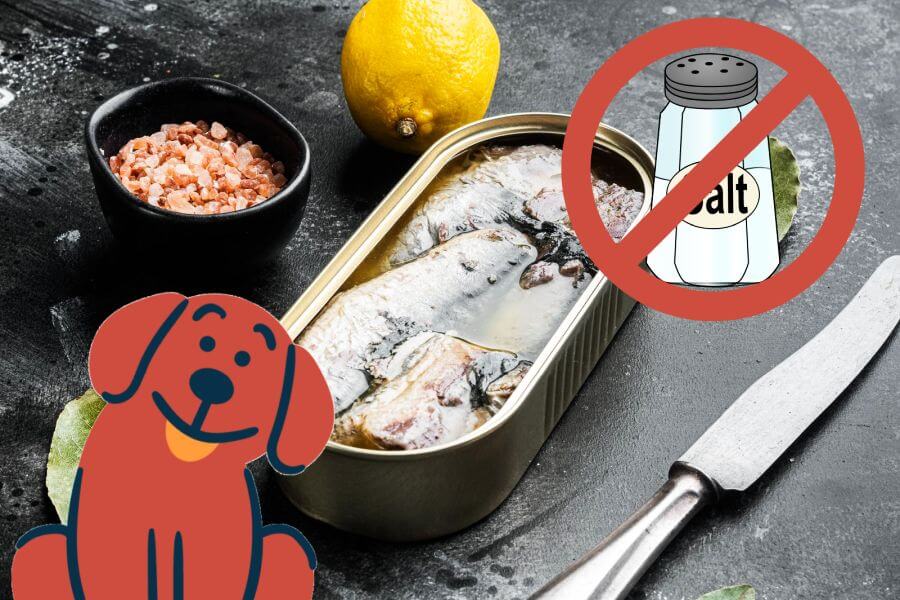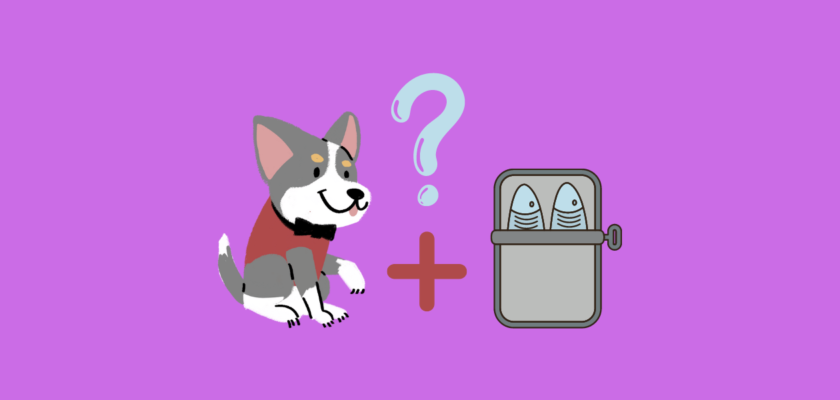Long Story Short
- Can dogs eat sardines? Absolutely! 🐟✔️
- Dogs can benefit greatly from the omega-3 fatty acids, B vitamins, iron, and calcium found in sardines 💪
- Small amounts of sardines occasionally is the proper amount ✔️
- Avoid giving your dog canned sardines with added salt or seasonings ❌
Is It Good to Feed Sardines to Dogs?
Can dogs eat sardines? Sure thing! They’re an excellent source of omega-3 fatty acids, which have been shown to improve cardiovascular health, joint function, and cognitive function in humans.

Think that’s all? Think again! Sardines contain high levels of B vitamins, iron, and calcium. Vitamin B12 improves energy levels and mental function. (As your dog gets older, the nutrients in sardines can be especially beneficial.) Sardines can help to reduce inflammation throughout the body, including the skin and joints. This can lead to a shinier, healthier coat and less itching, scratching, swelling, and pain. Thanks to the fish oil!
Are Sardines Always Safe for Dogs?
As we’ve said, these little fishies pack a punch when it comes to health benefits for our furry friends. But before you go handing your pooch a can of sardines, there are a few things you should know.
Sardines are quite fatty, which can be problematic if your pup overindulges. Too much fat in a dog’s diet can lead to weight gain and even pancreatitis. Yikes! So, can dogs eat sardines? Yes, but in moderation.
Start with a small amount of sardines and keep an eye on your pup’s reaction. If everything seems A-OK after a few days, you can slowly increase the serving size.
Now, you may have heard that some fish are high in mercury, which can be dangerous for both humans and canines. Lucky for us, sardines contain the lowest levels of mercury of any fish species. So, let’s give a round of applause for sardines – the superfood that keeps on giving!
Friendly Reminder 🐕
Sardines are also a good choice for our feline friends! Have you got both a dog and a cat? Then, one can of sardines equals two very happy pets!
Can Dogs Eat Sardine Bones?
There is no definitive answer to “Can dogs eat sardines with bones?”, as each dog will have a different reaction to eating them.
It also depends on whether you’re buying the sardines raw or canned. When they’re cooked before being put in a can, the bones soften so much that they’re unnoticeable. But if you’re buying them raw, the bones are still hard and fibrous. If you’re at all unsure about whether your dog can eat sardine bones, it is best to err on the side of caution and avoid giving them to him.
Can Dogs Eat Canned Sardines?
Let’s talk about canned sardines. They’re a convenient option for busy pet parents, but not all canned sardines are created equal. You should always check the label for any sneaky additives (like sodium or chemicals), which can be harmful to your pup’s health.
Now, if you’re giving your dog canned sardines for the first time, keep an eye out for any signs of tummy trouble. We’re talking diarrhea, vomiting, or any other unpleasant symptoms.

What Types of Sardines Are Good for Dogs?
The best type of sardine for your dog depends on their size and preference. Smaller dogs may do better with canned sardines because they’re easier to chew, while larger dogs may prefer fresh sardines.
Sardines packed in water, olive oil or sunflower oil are all safe for dogs. Sardines in tomato sauce, and with seasonings like garlic and onions, are a big NO-NO.
Otherwise, don’t feed your doggo too many of sardines because they do contain high levels of cholesterol (about 60% higher than beef). But if you’re not giving them more than 1–2 sardines 2–3 times a week, he’s going to be all happy and tail-wagging!
Pun of the Day 🐕
What did a dog say to a can of sardines? I canned live without you!
Can Dogs Eat Sardines? Final Reassurance
Time to sum up! Can dogs eat sardines? Yes! Just remember the rule of three/free:
- Free from additives, and seasonings ✔️
- Three at a time ✔️
Frequently Asked Questions
How Much Sardines Can I Give My Dog?
If you have a small dog, one sardine per week is a good amount. Medium-sized dogs can have a sardine 2–3 times a week. For large pups, you can increase the portion size to 2–3 sardines a few times per week.
What Happens If a Dog Eats Sardines?
Not much, he’ll just be happy to have had a snack 🙂 But if they somehow eat the entire can in one sitting, he could be a little sick 🙁
Is It OK to Give Dogs Sardines Every Day?
No. Too much fat can be harmful, so it’s important to only give your dog sardines occasionally.
Can I Mix Sardines With Dog Food?
As long as your dog is fine with it, yes, you can mix sardines into their regular dog food.
Similar Posts:
- Can Dogs Eat Fish? Benefits and Risks of Feeding Your Dog Fish
- Can Dogs Eat Tuna Fish? Is Canned Tuna Safe for Them?
- Can Dogs Eat Oysters? Risks of Feeding Your Dog This Seafood
- Can Dogs Eat Ham? Is It Bad for Dogs? | Risks and Benefits
- Can Dogs Eat Tilapia? Is Raw Fish Safe for Dogs?
- Can Dogs Eat Salmon? What About Salmon Skin?
- Can Dogs Eat Kidney Beans? The Safety and Health Benefits of Beans
- Can Cats Eat Canned Tuna? What About Mercury Poisoning?

